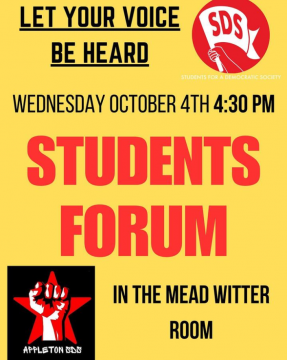On Wednesday, Oct. 4, Appleton Students for a Democratic Society (SDS) held a town hall meeting from 4:30 to 5:30 p.m. in the Mead Witter Room to discuss student concerns about living conditions and wages, among other issues. Attendees were handed lists of questions about their experiences.
One of the first issues that came up was wages. Sophomore Cristian Torres said that it’s hard to have a campus job that pays as little as $7.50 per hour and doesn’t go above $10.00. He described student wages on campus as “unlivable,” and “inconvenient.” Senior Ellie Lutterman, who is involved in SDS, said that she has an off-campus job that pays better, but she only has the time to do it once a week. She accused Lawrence of using the fact that working on campus is convenient to pay students poorly. Other attendees agreed that wages should be higher, and junior Caroline Murray pointed out that it’s a worldwide issue.
When the question of how Lawrence spends its money came up, Murray pointed out the discrepancy between administrative pay and pay for students, staff and faculty. The news outlet ProPublica reports the salaries of the highest paid staff at nonprofit institutions, including Lawrence University, although it is currently outdated and includes staff that have left, including former president Mark Burstein. Lutterman claimed that staff are leaving because of pay and working conditions and thinks that Lawrence should “chop from the top,” referring to administrative salaries.
On living conditions, Torres worries that with all of the resources directed towards athletics, designing new majors and attracting increasingly large first-year classes, Lawrence won’t be able to take care of its current student population. Specifically, Torres asked for better air conditioning and heating, more campus safety officers and a more accessible food pantry.
Students also complained about Bon Appetit (BonApp), Lawrence’s contracted food service company. Lutterman criticized BonApp for its hours, which students in the Conservatory have complained are inconvenient and means that they are paying for food they aren’t eating, and the quality of the food. Other student pointed out that food quality is bad because the employees are overworked with staffing issues and no pay increases. Junior Audari Tamayo, Head of Delegation for SDS, who used to work as a student worker in BonApp, recalled that when the workers put out flyers advertising a union, managers lied to non-English speaking workers and told them that the student workers wanted to cost them their jobs to get more hours. Tamayo said that at the time, they were campaigning to increase their break times from ten minutes.
“There’s a reason they’re understaffed,” said Tamayo. “Beyond the pay, working conditions are terrible.”
Tamayo added that last summer, when he worked on campus, Lawrence had all of the rules and benefits student workers are entitled to posted around campus, but that they disappeared last summer. Tamayo does not feel that this is an accident.
Murray pointed out that campus is inaccessible for a lot of students, with many halls that don’t have elevators or ways to get in that are wheelchair-user-friendly, and added that when she broke her foot last year she had to use the service elevator to get to meals after the usual Warch Campus Center elevator had broken. Lutterman added that getting accommodations for classes is extremely difficult, too.
Many of the attendees felt that Lawrence is overly performative in its values statements but does not do anything to address issues like sustainability or bigotry. Murray said that Lawrence’s commitment to racial justice is hollow if it continues to be a classist institution that underpays student workers.
“Lawrence virtue signals about antiracism,” said Murray, crediting students, faculty and the Menominee and Ho-Chunk Nations for Lawrence’s celebration of Indigenous Peoples’ Day. “But nothing that has been positive has ever been the result of administrative choices.”
Tamayo added that Lawrence doesn’t do much to address acts of bigotry on its own campus.

